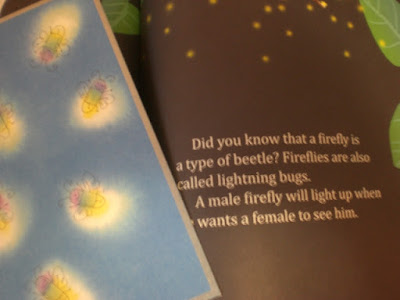 |
| The card cover & the bug book's text |
The story behind his comment. When he proposed marriage (after we'd resumed courtship after a gap of some seven years), he was living in central Washington and I was near Chicago. When he flew to Chicago to help me drive back for our wedding, it was summer and “firefly” season in the Midwest. The tiny critters fascinated them with their luminescence.
Throughout our marriage, when we shopped thrift stores, he often gravitated over to the card racks for something that seemed “just right” to keep the romance going. I appreciated that. I didn't care that they maybe cost a quarter instead of the inflated card store price. I'd find notes on the kitchen table or on my pillow. What a guy. After his death, I found his “stash” of future romantic, birthday, or anniversary cards in his desk drawer. Oh, pass the tissue box. Some of them were pretty heavy-duty, but enabled him to express his heart in my love language, which is “written communication.”
That last love note was so precious that I tucked it in the flyleaf of my Bible. Shortly after his death, I was reading a book about bugs to my grandsons. I came to a page about fireflies. The text said: “Did you know that a firefly is a type of beetle? Fireflies are also called lightning bugs. A male firefly will light up when he wants a female to see him.”
Oh, pass the tissue box. Yes, instead of the flickering “male” firefly, this female” “lit up” when I got his love notes. Even after nearly 42 years of marriage, those little perks still meant a lot.
Kind words are not just for lovers. They are the lubricant for all relationships, personal and business. Intimate and casual. I've known the sting of mean words—even invented words, embellished with extra prefixes and suffixes that made them sound erudite and highfalutin. I considered “the source” and tried to move on. But those hurtful times just reinforced my desire to be more proactive about building people up, expressing appreciation, and asking God to help me see opportunities to be more Christlike through my words.
Maybe it's reminders of wounding words I endured in the past from unhappy people, or this difficult grieving time. But in this season of life, I'm asking the Lord to make me more sensitive to kind words. Yes, words that point to Jesus, who connected heart and mouth (or penmanship!): “The good person out of the good treasure of his heart produces good, and the evil person out of his evil treasure produces evil, for out of the abundance of the heart his mouth speaks” (Luke 6:45).
See more at this website: What Does the Bible Say About Kind Words? (openbible.info)



